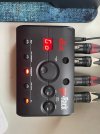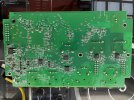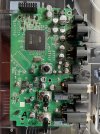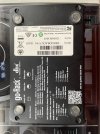My home audio chain is mostly digital and looks like:
[PC] -> [USB to SPDIF] -> [digital equalizer] -> [digital crossover + DACs] -> [power amps] -> [subs and mains]
I recently bought the Topping D10B for USB to SPDIF conversion, and that offered a possibility to apply the Behringer SX3040 V2 sonic exciter.
This because I use the Behringer DEQ2496 as digital equalizer, and it has an ADC on board. Since the Topping D10B has a DAC on board, I could create an analog detour via the sonic exciter:
[PC] -> [D10B] -> [DEQ2496] -> [digital crossover + DACs] -> [power amps] -> [subs and mains]
----------|------------|
----------`->[SC3040] -'
Now I could choose whether to use the digital chain without the sonic exciter, or to insert the sonic exciter as a short analog detour. This simply by selecting the right input on the DEQ2496.
Why did I do this..?
Well, I sometimes listen to older pop music recordings and they often disappoint in terms of sound quality. I have a memory of how they sounded in my youth, through my solid state amp with loudness and tone controls engaged. I though using the sonic exciter for these older recordings would beef them up a bit and make them sound more like in the 'early days' . Since the quality of these recordings was not that good to begin with, the additional noise and distortion of the sonic exciter analog detour could be taken for granted.
Why am I surprised and confused?
Simply put: I am surprised that I like the sonic exciter with almost ALL of my music (mostly pop/rock and some jazz). Not just the bad recordings but the good ones as well. When used in moderation, it really adds that little extra punch and sparkle without messing up the recording. When I switch back to my digital chain (which can be done almost instantaneously), the music simply sounds more dull, less alive. I am surprised that a low-cost analog device that adds noise and harmonic distortion can make my music sound so good. The only downside so far is a bit of extra voice sibilance in some recordings that were not filtered well on voice sibilance to begin with.
And that confuses me, because the hard science of audio tells me that the analog bypass will increase noise and distortion (the exciter even deliberately adds harmonic distortion) and hence the digital chain is superior...
Why did I post this? Not because I am affiliated with Behringer in any way. I think it may give a nice insight in psychoacoustics. It may also help some of you to get that beefy sound you remember from the past, when you were using an integrated amplifier with loudness and tone controls engaged. It may even be a low-cost alternative to using tube amplifiers (which also add harmonic distortion).
An impression on how a sonic exciter can change the sound, can be found in this video (though I use it more moderately):
[PC] -> [USB to SPDIF] -> [digital equalizer] -> [digital crossover + DACs] -> [power amps] -> [subs and mains]
I recently bought the Topping D10B for USB to SPDIF conversion, and that offered a possibility to apply the Behringer SX3040 V2 sonic exciter.
This because I use the Behringer DEQ2496 as digital equalizer, and it has an ADC on board. Since the Topping D10B has a DAC on board, I could create an analog detour via the sonic exciter:
[PC] -> [D10B] -> [DEQ2496] -> [digital crossover + DACs] -> [power amps] -> [subs and mains]
----------|------------|
----------`->[SC3040] -'
Now I could choose whether to use the digital chain without the sonic exciter, or to insert the sonic exciter as a short analog detour. This simply by selecting the right input on the DEQ2496.
Why did I do this..?
Well, I sometimes listen to older pop music recordings and they often disappoint in terms of sound quality. I have a memory of how they sounded in my youth, through my solid state amp with loudness and tone controls engaged. I though using the sonic exciter for these older recordings would beef them up a bit and make them sound more like in the 'early days' . Since the quality of these recordings was not that good to begin with, the additional noise and distortion of the sonic exciter analog detour could be taken for granted.
Why am I surprised and confused?
Simply put: I am surprised that I like the sonic exciter with almost ALL of my music (mostly pop/rock and some jazz). Not just the bad recordings but the good ones as well. When used in moderation, it really adds that little extra punch and sparkle without messing up the recording. When I switch back to my digital chain (which can be done almost instantaneously), the music simply sounds more dull, less alive. I am surprised that a low-cost analog device that adds noise and harmonic distortion can make my music sound so good. The only downside so far is a bit of extra voice sibilance in some recordings that were not filtered well on voice sibilance to begin with.
And that confuses me, because the hard science of audio tells me that the analog bypass will increase noise and distortion (the exciter even deliberately adds harmonic distortion) and hence the digital chain is superior...
Why did I post this? Not because I am affiliated with Behringer in any way. I think it may give a nice insight in psychoacoustics. It may also help some of you to get that beefy sound you remember from the past, when you were using an integrated amplifier with loudness and tone controls engaged. It may even be a low-cost alternative to using tube amplifiers (which also add harmonic distortion).
An impression on how a sonic exciter can change the sound, can be found in this video (though I use it more moderately):





